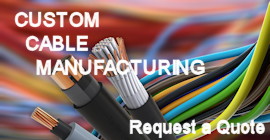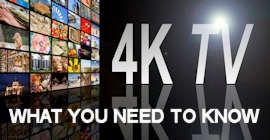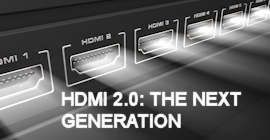Help > HDMI Cables FAQ
HDMI Cables FAQ
So, why are OUR HDMI cables priced so reasonable? Read on... Also listen to
this short clip of Bob O'Donnell & Ronald Rosberg (ABC Radio/KSFO), host
of the award-winning
O'Donnell
on Technology radio program, on what he had to say about My
Cable Mart.
The following are answers to questions we have received by phone and email over the past few months regarding our HDMI cables:
- I am confused by all the different connection types. What works with what?
- I am completely NEW to HDMI. What can you tell me about this technology?
- Why are YOUR HDMI cables priced so much cheaper than ALL the rest of the competition?
- So, are your $8.00 cables the same as the $80.00 cables?
- Some web sites claim their cables are "better" because they using a thicker gauge wire, and thus have less resistance resulting in a better signal. Is that true?
- So, why does your competition sell the cables for more? What is the purpose of this?
- If I buy an HDMI cable from you, how do I know I am getting the best possible HDTV signal?
- What if I buy an HDMI cable from you guys, and it doesn't work?
- What about "shielding"? I see some your cables are "double shielded". Some of your competitors are "triple shielded"
- What about versions of HDMI? Do I need to be concerned about this when buying a cable?
- Explain your Money Back Guarantee
- HDMI 1.3a, Category 2, Deep Color. What kind of HDMI cable do I need?
- I am seeing some cables saying they now support "120Hz" or 240Hz. Do your cables support 120Hz and 240Hz?
I am confused by all the different connection types. What works
with what?
We have a connection guide that shows all the possible
HDMI, DVI, and VGA connections that are possible. While HDMI is
always a digital connection, DVI can be digital OR analog. VGA is
always analog. Click HERE
for our connection guide.
I am completely NEW to HDMI. What can you tell me about this
technology?
HDMI is the de facto standard digital connection
for consumer electronics products. Over 460 manufacturers will ship
nearly 60 million HDMI-enabled devices in 2006, with a projected
installed base of over half billion HDMI devices by 2009.
The video below requires the latest version of
Flash Player:
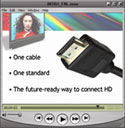
Why are YOUR HDMI cables priced so much cheaper than ALL the rest of the
competition?
We purchase our HDMI-HDMI, and HDMI-DVI
cables directly from the manufacturer in bulk. What exactly is
"bulk"? Yes, by the container load of thousands of cables.
Instead of marking them up 500-1000% like some retailers (both bricks
and mortar store, and some on-line stores - you know who you are), we
mark them up to make a reasonable profit instead. Our cables are
packaged in "OEM packaging" which is far less expensive than equivalent
retailed packaged cables that typically sell for ten times our price.
|
So, are your $6.00
cables the same as the
$80.00
cables? |
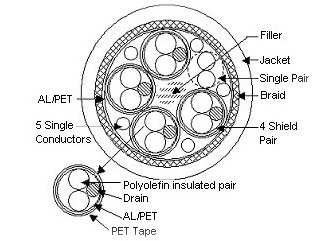 |
Some web sites
claim their cables are "better" because they using a thicker gauge wire,
and thus have less resistance resulting in a better signal. Is
that true?
Thicker gauge wire for LONGER lengths is needed to minimize signal
loss due to natural resistance that copper has in a wire. Silver
coating is also part of the manufacturing process for all our HDMI
cables. All of
our cables are purchased from an HDMI certified manufacturer.
This means that the cables have been submitted for testing and
certification. We have copies of the HDMITM certification document
on file.
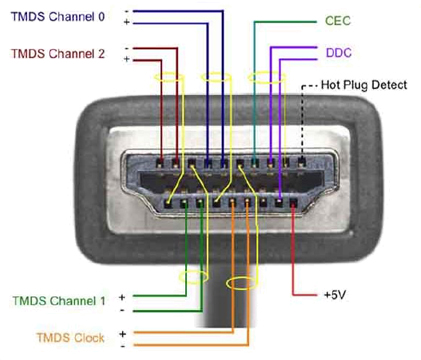 All of our shorter length (3 to 16ft) cables are
28 AWG (American Wire Gauge), and will support ANY HDTV resolution,
as well as support ANY device using an HDMITM connection.
Cables that are 20 to 39ft are 24 or 22 AWG, and so on. Most of
our HDMI (and
HDMI/DVI) cables have ferrites to eliminate any outside radio
interference. Most are triple shields - some are only double-shielded. All have
silver-coated conductors. All are guaranteed to support all HDTV
formats (1080p, 1080i, 720p, 720i) except where specifically noted.
All our cables are RoHS compliant. All have 24K
gold plated connectors to resist corrosion. All Supports 8-channel
digital audio on same cable. Also supports
6-channel, 96kHz audio. All of these specifications are basic
specifications that a manufacturer must meet to be certified.
All of our shorter length (3 to 16ft) cables are
28 AWG (American Wire Gauge), and will support ANY HDTV resolution,
as well as support ANY device using an HDMITM connection.
Cables that are 20 to 39ft are 24 or 22 AWG, and so on. Most of
our HDMI (and
HDMI/DVI) cables have ferrites to eliminate any outside radio
interference. Most are triple shields - some are only double-shielded. All have
silver-coated conductors. All are guaranteed to support all HDTV
formats (1080p, 1080i, 720p, 720i) except where specifically noted.
All our cables are RoHS compliant. All have 24K
gold plated connectors to resist corrosion. All Supports 8-channel
digital audio on same cable. Also supports
6-channel, 96kHz audio. All of these specifications are basic
specifications that a manufacturer must meet to be certified.
(Image courtesy HDMI LLC)
So, why does your competition sell the cables for more? What is the purpose of this?There is a perception that if you price a cable higher, then it must be better. We will honestly say for our HDMI cables, this simply is NOT the case. We have joked with some customers that we can charge them more if they want...
If I buy an HDMI
cable from you, how do I know I am getting the best possible HDTV
signal?
HDMI (and DVI) use technology that transmits an encoded digital
signal from a source (such as a satellite, cable, or DVD player), to a
target (such as an LCD or PLASMA TV) in a similar manner that computers
communicate using TCP/IP. If you plug an HDMI cable in, and you
see the resulting picture on your HDTV, the transmission was successful.
If there is ANY failure in an HDMI cable - there will simply be no
signal at all - resulting in a black or blue screen on the target HDTV.
So, an HDMI cable either works 100.00%, or 0.00%.
What if I buy an
HDMI cable from you guys, and it doesn't work?
We sell over 6,000 HDMI
cables each month. Our defect rate for HDMI cables is one of the
lowest in the industry at 0.02%. We guaranteed our HDMI cables for
LIFE, and provide immediate replacements.
What about "shielding"? I see your cables are
"triple shielded".
Most of our HDMI cables are triple shielded. Some are only "double
shielded" - which means that 2 separate layers of tin shielding are
wrapped around the copper wires inside the cable. This is MORE
than enough. Quoting a
paragraph from Steve Venuti, Director of Marketing, for the
HDMI Licensing LLC in an Q&A article written for
Electronic House
(click
here for
the complete, informative article):
"Fatter cables do not necessarily mean better
signals. Previously, fat cables were deemed
superior because the copper was thicker and the
cables carried more shielding. Additional shielding
reduced the likelihood of interference between the
copper strands, which led to a better signal.
"In the world of digital cables, there's no need for shielding since there is no possibility of interference within a cable. As for the thickness of copper, however, thicker copper will be able to extend the length of a digital signal, but for shorter cable lengths (two meters and under), there is no need for overly thick copper strands. In fact, thicker cables can sometimes be problematic since they are less flexible to bend around sharp corners and the increased weight can cause them to fall out of vertically mounted connectors."
What about versions of HDMI? Do I need to be concerned about this when buying a cable?
Versions of HDMI are not affected
by the cable itself. Versions of HDMI describe hardware FEATURES
that a hardware device may have, or be compatible with. A cable originally certified to
meet v1.0 standards will most likely be certifiable for many standards
going forward. All versions of the HDMI specification support the
ability to watch HD-DVD / Blu-Ray content in high definition up to 1080p
resolution. However, there may be non-HDMI reasons that prevent some
devices from accessing content in high definition, including lack of
HDCP support. Manufacturers of cables frequently re-submit cables
back to HDMI for re-certification without making any engineering or
manufacturing changes to the cable itself. To quote Steve Venuti
(click
here for
the complete, informative article):
"I advise consumers to never focus on the specific
version of HDMI, but rather, on the feature set of
the device, such as 1080p capability, DVD-Audio
support, etc. In fact, looking for the version of HDMI
supported in a product does not mean that all the
latest features possible from the specification are
actually implemented in the product. So again, the
key is for consumers to seek the feature, not the
specification.
Explain your Money Back Guarantee
Periodically, if you use longer lengths
(ie greater than 65ft) of HDMI cable, and use HDMI wall-plates,
switches, or splitters, the HDMI signal weakens to the point that the
signal can be "lost". The use of an
HDMI signal enhancer/booster
then might be needed. We offer a 100% money-back guarantee
that the HDMI-HDMI or HDMI-DVI cable will perform as advertised.
If the cable does NOT work, you can either return it for a refund, or
allow us to provide a replacement cable. Your choice.
This is our money-back guarantee to you. Click
HERE for details and
conditions (yes, the sorta fine print!)
I am seeing some cables saying they now support "120Hz/240Hz".
Do your cables support 120Hz or 240Hz?
The 120Hz - and now "240Hz" is an electronics feature found in some
newer LCD and plasma TV. This TV feature interpolates frames and
inserts them between the normal frames to help remove, or "smooth out"
video that would normally appear "jerky". 120Hz technology doubles
the frame rate from 60 to 120 frames per second without repeating the
same image to make more frames. 240Hz technology quadruples the frame
rate. In both case, the TV intelligently calculates the
'middle' image between frame A and frame B and inserts it in between,
making a fluid transition from one frame to the next. This
technology has NOTHING to do with the cable itself. Some cable
vendors are misleading customers and promoting "120Hz or 240Hz technology" as a
cable feature. It is NOT. So, to answer the question - ANY
quality HDMI cable will support the 120Hz or600Hz feature found in newer TVs.
Want more information about 240Hz? PC Magazine have an excellent article on the technology itself.
Also, a great quote from AVFORUMS (that we frequently contribute to):
"There's a lot of "Hz" specs and claims out there. Don't even
waste money on cables that claim to be "120Hz" compatible just because
you have a display capable of refreshing at 120Hz - it's just marketing
hyperbole. Any HDMI 1.3 compatible cable can support the higher
bandwidth made available by the HDMI 1.3 spec. That bandwidth can be
used to carry expanded gamuts, higher bit depth color, higher resolution
than 1920x1080, or a higher frame-rate than 60Hz..."
** Cables of lengths of greater than 50ft may not support 1080p without the use of a signal booster. Check the specifications on the length of cable you are interested in.
Read more about HDMI technology and FAQ's HERE
"HDMI, the HDMI logo and High-Definition Multimedia Interface are trademarks or registered trademarks of HDMI Licensing LLC.". All products sold by MyCableMart.com are purchased from certified HDMI Adoptors (distributors and/or manufacturers). Customers wishing to see any certification documentation for such products can make such request in writing.
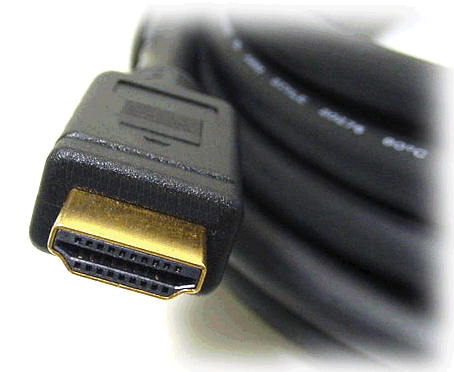
Our HDMI cables are guaranteed for life, and meet
HDMI 1.4a or 1.4b standards, & are RoHS Green Certified!
Why
pay more?



